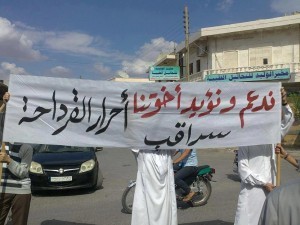Social Media Monitor 08-10-2012

Assad’s hometown rebels against him
A demonstration in Kfar Nubbul in the province of Idlib. “Qirdaha, we’ll be with you till death.” – YouTube.
Syrian Facebook pages were recently covered with discussions of the news from Qirdaha, President Bashar al-Assad’s hometown. An argument reportedly took place there between a man from the Assad family and another from the Othman family, and soon evolved into a fight between regime supporters and opponents, which led to shooting.

The Local Coordination Committee, LCC, of Qirdaha commented on the event, declaring that Alawites, members of the religious sect to which Assad belongs, are not all supporters of the regime.
“Members of the Assad family who are benefitting [form the current regime] are [Bashar al-Assad’s] uncles, cousins and some of their protégés, and these hardly make up one quarter of the Alawites,” the LCC wrote on Facebook. “The remaining three quarters live in poverty, some of them perhaps below the poverty line, just like the majority of the Syrian people.”
Rida Kamel refused this rational, and commented on this statement, saying:
“If [Alawites] are not benefitting, then why haven’t we heard them speak out? Why haven’t they condemned the regime’s criminal acts? Are they scared to do so?!”
Another group of opposition activists from the coastal area, where Qirdaha is located, Nahl Al-Sahel, tried to explain the reasons behind this incident.
“The fighting that took place in Qirdaha was not a momentary emotional reaction; it took place because the majority of Alawites feel oppressed by the ruling mafia,” the group wrote on Facebook.
There were local reports on Facebook suggesting that the clashes extended to Alawite suburbs of Damascus.
“The clashes in Qirdaha have reached the Alawite-majority quarter of Ish Al-Warwar,” Sima Nassar wrote. “People from al-Khair family have targeted a shabbiha [regime thugs] bus in retaliation to the abduction of three girls from the family. More than 10 shabbiha have been killed and the confrontation is ongoing.”
Fadi Dahuk, a Syrian journalist living in Lebanon, suggested that the regime is trying to drag Syria into a regional war in order to restrain protests taking place in the areas considered a hotbed of support for the regime.
“The regime is trying to downplay the revolution in the coastal area, as well as limit the effects of the protests in Iran and also relieve Hezbollah from pressure, by provoking a calculated military intervention [in Syria],” he wrote on Facebook.
Remembering the October War
Syrians commemorated the 39th [:anniversary of the war waged on October 6, 1973 by Syria and Egypt against Israel, in the aim to regain their territories that were occupied in 1967. This war is officially celebrated as a victory in both countries, even though the Israeli army, which was taken by surprise and suffered heavy losses, was able to push back the offensive.

Islam Abu Shakeer, a Syrian researcher who lives in the United Arab Emirates, believes that Syria did not win that war.
“Had we really won the October war, [this regime] would not have survived till this day … it was a bitter defeat and we are now paying the price,” he wrote on Facebook.
Writer Subhi Hadid replied to that thought, saying that the war that really produced dictators was the 1967 defeat.
“The catastrophic victory took place in ’67 when Israel failed to overthrow the progressive regime in Syria and Egypt,” Hadid commented sarcastically.
The war in 1967 is referred to in Arabic as an–naksa, or setback. However, propagandists of the United Arabic Republic, which, at that time, joined both Syria and Egypt under the leadership of President Gamal AbdelNasser, downplayed the effects of the defeat since the regime survived.
Director Ussama Khodr made a sarcastic comment about the shelling of Homs, saying it is in celebration of the war’s anniversary.
“More than 21 artillery shells were fired at Homs as a commemoration of October war — artillery fire targeted the city’s both living and dead people,” he wrote on Facebook.
Fadi Assaf wrote about a war veteran, without naming him, who is now suffering because of the ongoing fighting in Syria.
“On this day in 1973, a Syrian engineer designed the bridge that was used to cross over into [the occupied territories] … he did not imagine that 39 years after he will be under siege in his own home, without electricity or food. He now needs a bridge to cross over to Damascus.”
Post-regime state
One of the most popular debates among Syrian opposition activists revolves around the nature of the political system in Syria after the fall the current regime.

Activist Mu’ayyad Skeif reminisced on the heritage of “ancient Syrians who founded the first civil state and society in history, while we [present-day Syrians] are still learning the alphabet of state [-building] and institutional work.”
Skeif then wondered, “Are we descendants of Syrians? Are we Syrians?”
Khawla Dunia contemplated the foundation of an Islamic state according to modern terms.
“If you want an Islamic state, let it be a modern one so that we could have an eminent position …in terms of technological progress, democracy and diversity. There is nothing modern about substituting a knife for a tank or longing for the times of female slaves and conquest,” she wrote on Facebook.
Shaghouri Souri replied with the following: “Islam is a public declaration of the emancipation of man from slavery to another man; its goal is to topple the regimes based on man’s enslavement and subordination by another man. After this stage, people will be set free – they will be able to choose any faith they want.”
